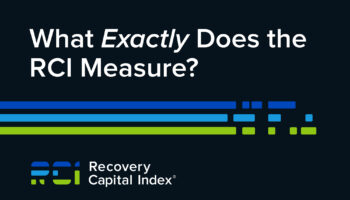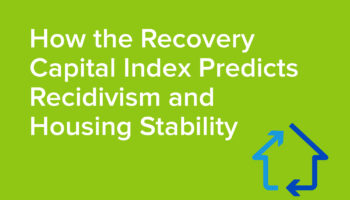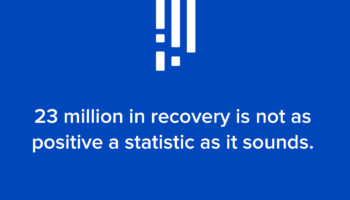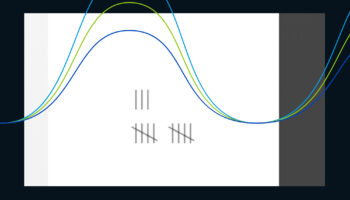Insights & Resources
Filtered by: Data & Insights
1,000+ RCI’s Completed in June
1,017. This was the total number of Recovery Capital Index (RCI) survey's completed in June 2023; and it was the first month with 1,000+ completions since launching Commonly Well at the end of May 2020. It's a milestone worth a few moments of reflection.
Read More →By David
7/3/23
Bringing more diversity of thought to behavioral healthcare
When we explore best practices in behavioral healthcare, we constantly look inside our field and rarely seek best practices of psychology and experience from other services and industries. This is limiting our ability to be more effective and truly great practitioners of care.
Read More →By David
6/22/23
Data Ownership and Privacy
Your healthcare data might be about you, but it’s not yours – not really. Current regulations seem to protect your data. Despite the appearance of strong privacy regulations, there’s a lot of grey area and rampant misuse. Yes, let’s fix the laws, but we need higher ethical standards and principles for data capture and use.
Read More →By David
5/31/23
The Recovery Capital Index: A Validated Assessment
The Recovery Capital Index (RCI) measures what it says it measures: addiction wellness. Developed at Face it TOGETHER (FIT) by David Whitesock (now CEO & Founder of Commonly Well), the RCI is built on three domains, nine indicators, and 22 components which have been proven to positively affect recovery and provide a comprehensive assessment of intervention effectiveness.It also focuses on longitudinal health outcomes, giving therapists and peer coaches insights into an individual’s progress, growth, and well-being over time.
Read More →By David
3/28/23
How the Recovery Capital Index Predicts Recidivism and Housing Stability
The Recovery Capital Index, by design, does not predict sobriety, but it can supply indications of return to use. When the data comes together with an individual’s story, we can design effective interventions based on that predictiveness. The number one question we get asked about the Recovery Capital Index (RCI) is, “Does it predict sobriety?”Answer: No. But it can supply indications of a problematic return to use or other behaviors.We understand why this is the question so many ask. It has everything to do with the traditional view of addiction; that recovery from addiction is synonymous with abstinence. Clinical care and society have long measured success as prolonged abstinence. So, it makes sense that most wonder about whether the RCI predicts sobriety.
Read More →By David
3/7/23
The Three Domains of a Resilient Life
To move beyond sobriety as the only measure of recovery success, we must shine a spotlight on the social determinants of health. The Recovery Capital Index (RCI) achieves this by respecting the entire presence and experience of a person.
Read More →By Patrick
2/28/23
23 Million in Recovery: Not As Positive As It Sounds
Addiction and recovery advocates, for the last decade, have used 23 million people in recovery as their primary statistic to combat stigma and raise funds. Digging into the data, however, provides a more powerful narrative that recovery leaders and advocates need to know and use.
Read More →By David
2/24/23
Role of loss aversion in addiction recovery
Loss aversion is a strong behavioral and psychological bias that needs more attention and application in addiction careThe reason we need to incorporate more psychology and behavioral science into our care models is simple …The time to recover from addiction is unnecessarily long and difficult.
Read More →By David
11/30/22
On celebrating good decisions
When you are heads down working toward a goal, have you ever gotten a small win or made a change in life and never thought twice of it? You just took it for granted and continued one.This happens all the time and to all of us. But this is actually a bad habit.
Read More →By David
10/9/22
On our obsession with abstinence
Why do we fixate on sobriety or abstinence regarding addiction and alcohol or drug problems?For so long, the only socially and clinically acceptable outcome was the complete cessation of use for the rest of one’s life."Get on the wagon," they say, "you’re an alcoholic now and forever."Fall off the wagon, you’re a failure.
Read More →By David
9/28/22
Reflecting on independence
On this Independence holiday, please indulge a few personal reflections.17 years ago on this day (3 JUL 2005), I had my last alcoholic drinks.I don't typically write about or regularly celebrate this sober anniversary. That exercise lost its purpose long ago. But I feel compelled to offer some thoughts given some of the trends around wellbeing, stress, and alcohol consumption.
Read More →By David
7/3/22
Don’t pick the outcome, pick the outcomes framework
When an organization picks a specific outcome, it will do whatever it needs to get that outcome.In the world according to Simon Sinek, this is a finite mindset. A finite mindset can ruin a business. In healthcare — and especially addiction care — it can destroy lives.Addiction treatment would be better if it adopted an infinite mindset.
Read More →By David
3/31/22











